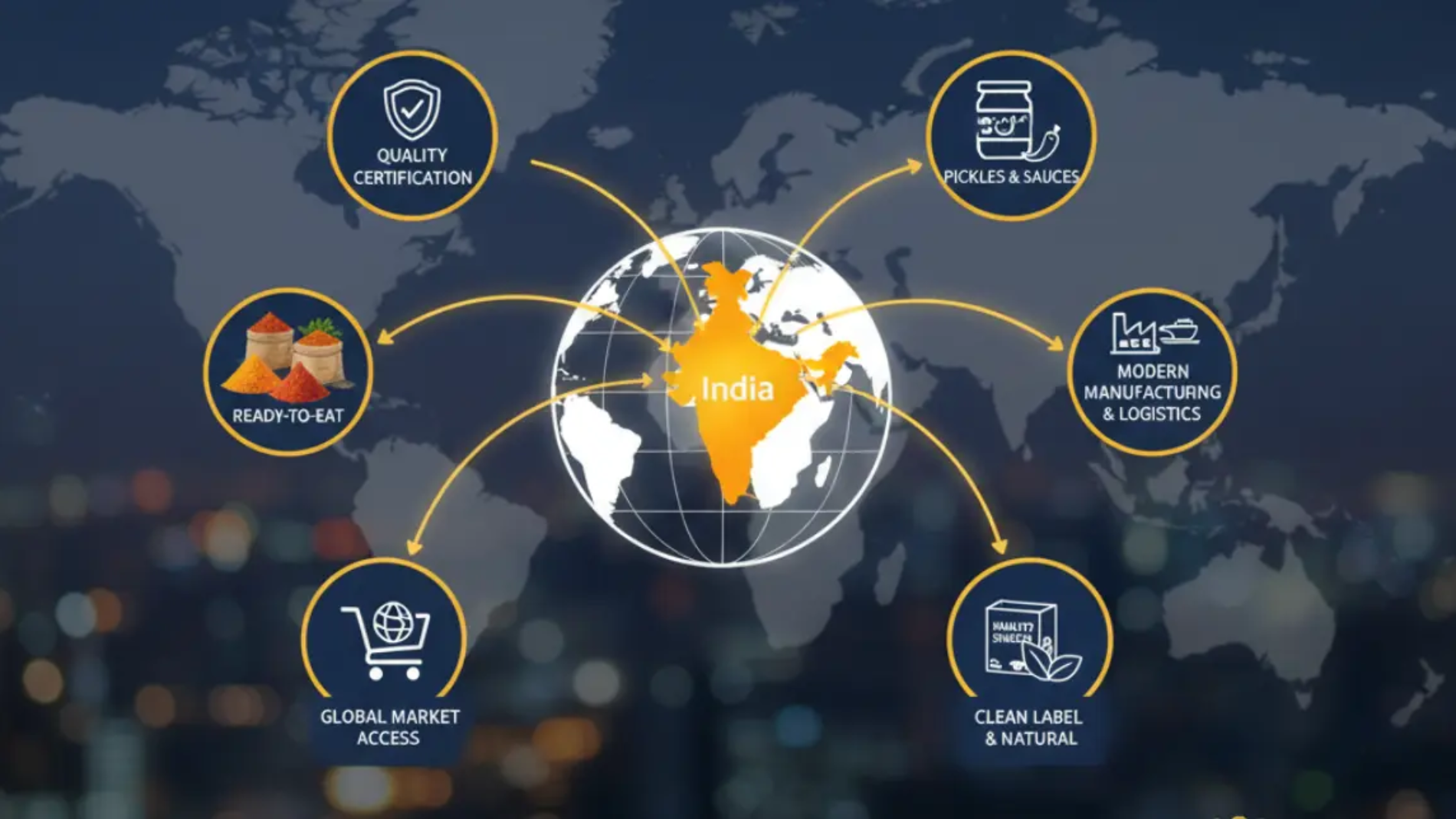The global pantry is changing. In decades past, India was known primarily as an exporter of raw commodities—rice, spices, and tea. Today, a powerful transformation is underway. A new wave of global demand is surging, and it’s focused on exporting processed food directly from India. From ready-to-eat meals in New York to dehydrated ingredients in Dubai, importers and distributors are turning to Indian food exporters as partners for growth.
This isn’t an accident. It’s a boom driven by a convergence of powerful market forces. As an expert export-import partner, we see these drivers every day. Here’s a look at why the demand for processed food from India is not just growing, but booming.
1. The "Clean Label" and Health-Conscious Revolution
Modern consumers are no longer just shoppers; they are detectives. They are reading labels, rejecting unpronounceable chemicals, and actively seeking out “clean label” products. This is where India’s natural agricultural base becomes a massive advantage.
There is a soaring global demand for natural and plant-based foods, and India is perfectly positioned to supply them. The export of processed food is increasingly focused on items that are inherently healthy. Think of:
Natural Sweeteners: Like premium jaggery powder, a pure, unrefined sugar.
Functional Ingredients: Such as high-curcumin turmeric powder or high-fiber green banana flour.
Plant-Based Staples: A vast array of pulses, millets, and vegetable-based products.
Importers are realizing that food ingredient sourcing from India provides them with a direct line to the “clean” and “natural” ingredients that modern consumers demand.
2. The Rise of "Ready-to-Eat" (RTE) Convenience
The global pace of life has accelerated, and with it, the demand for high-quality, convenient meals. The RTE food export sector from India is a direct response to this. Consumers worldwide want authentic, flavourful food without spending hours in the kitchen.
Indian manufacturers have mastered the technology—like retort packaging—to create shelf-stable, delicious, and authentic meals. This includes:
Authentic curries and biryanis
Ready-to-cook sauces and pastes
Instant meal mixes
For an importer, these products offer high-margin potential and cater directly to the convenience-driven lifestyle of consumers in the US, Europe, and the Middle East.
Spice Up Your Business with Authentic Indian Flavors
Import and Export Excellence from India!

3. World-Class Quality and Global Certifications
The outdated perception of Indian manufacturing has been replaced by a new reality of high-tech, certified quality. Modern Indian food exporters operate from facilities that are not just compliant, but world-class.
Global Certifications: Top-tier suppliers hold certifications like HACCP, ISO 22000, and are often registered with the US FDA.
Advanced Technology: From advanced dehydration techniques to state-of-the-art cold chains, the infrastructure has matured.
Government Support: Bodies like APEDA (Agricultural and Processed Food Products Export Development Authority) have been instrumental in helping exporters meet and exceed global quality and testing standards.
This commitment to quality means an importer can source processed food from India with the same confidence in safety and consistency as they would from any other major global supplier.
4. Unmatched Cost-Effectiveness and Value
India’s unique position as one of the world’s largest producers of raw agricultural goods (milk, spices, fruits, vegetables) provides a significant competitive advantage. This abundant raw material base, combined with efficient and cost-effective manufacturing practices, allows Indian food exporters to offer an unparalleled value proposition.
Importers can source high-quality, value-added products at a price point that is often more competitive than sourcing from other regions. This allows for better profit margins, greater market penetration, and a superior product for the end consumer.
5. The "Private Label" and Customization Opportunity
Perhaps the most significant B2B driver is the flexibility of Indian manufacturing. Importers are no longer limited to just distributing existing brands. The real opportunity lies in private label food.
Indian manufacturers are famously agile and excel at customization. An importer in the UAE or USA can partner with an exporter like Aquaconnect Exim to:
Develop a unique sauce or spice blend.
Create a proprietary line of RTE meals.
Design custom packaging for their target market.
This allows an importer to build their own brand and capture long-term market share, transforming them from a simple distributor into a brand owner.
This combination of quality, convenience, cost, and customization is why the global demand for processed food from India is not just a trend—it’s the new standard for smart sourcing.
Spice Up Your Business with Authentic Indian Flavors
Import and Export Excellence from India!

Frequently Asked Questions (FAQs)
1. What is considered “processed food” for export from India?
This is a very broad category that includes any food that has been altered from its natural state. It includes Ready-to-Eat (RTE) meals, frozen foods, dehydrated products (like onion or banana powder), fruit pulps and concentrates, pickles, sauces, and dairy products.
2. What are the most popular RTE food export items right now?
The most popular RTE food export items are authentic Indian meals such as packaged curries (like Paneer Tikka Masala, Dal Makhani), biryanis, and various ready-to-cook sauces and pastes that provide a quick base for a home-cooked meal.
3. How can I be sure of the quality when sourcing from India?
Always partner with a reputable exporter who is transparent about their operations. Ask for their quality certifications (e.g., HACCP, ISO 22000, US FDA Registration) and request a Certificate of Analysis (COA) for the specific product you are importing.
4. What is “clean label” food ingredient sourcing?
“Clean label” refers to sourcing ingredients that are simple, natural, and easily recognizable. This means avoiding artificial flavours, colours, preservatives, and chemical-sounding names. Sourcing a product like “Organic Turmeric Powder” instead of a synthetic yellow dye is a perfect example.
5. Is it profitable to create a private label food brand using Indian manufacturers?
Yes, it can be highly profitable. The competitive manufacturing costs in India allow you to create a high-quality product with strong profit margins. It gives you control over branding and pricing, which you don’t have when distributing other brands.
6. What are the key export destinations for processed food from India?
The top destinations are a mix of countries with a large Indian diaspora and markets with a high demand for global foods. Key importers include the USA, UAE, UK, Saudi Arabia, Australia, and Germany.
7. How has the Indian government supported the export of processed food?
The Indian government, through bodies like APEDA and the Ministry of Food Processing Industries (MoFPI), has actively supported the sector. They provide financial assistance, help in upgrading infrastructure (like Mega Food Parks), and assist exporters in meeting international quality standards and participating in global trade fairs.
8. Why is the large Indian diaspora a factor in this boom?
The Indian diaspora (people of Indian origin living abroad) acts as a powerful “beachhead” market. They create an initial, stable demand for authentic Indian products. This allows brands to gain a foothold in major retail chains, which then introduces these flavours to the broader, non-Indian population.
About us
We bridge the gap between local producers and global markets, ensuring seamless trade facilitation with exceptional quality and reliability. We provide quick delivery services with customized packaging with all approval of International Certificates (Spices board India, MSME, IEC, fssai, FIEO, APEDA, EU certification, FDA and Many More)
Contact us
Shop No. 3, Ganesh Prestige Sr. No. 2/15, Near Laxmi Jewellers, Dhanakawadi, Pune – 411043, Maharashtra INDIA.
Call On
+91 9545205050
+91 9822422584



Leave A Comment